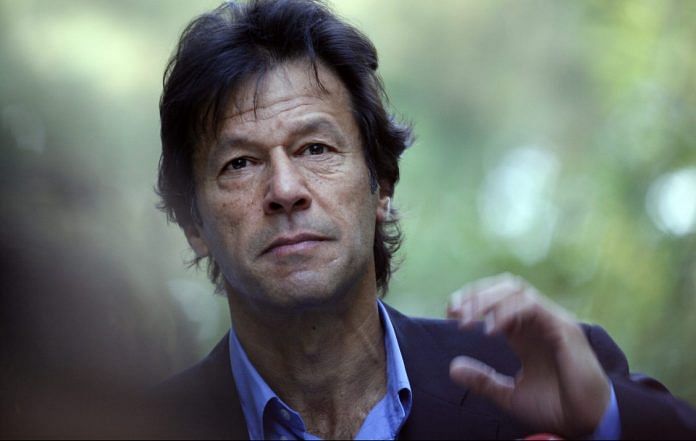In Imran Khan, Pakistani army has created a political rubber stamp to deal with the outside world through remote-control
On a day when India observed the 19th Kargil Vijay Diwas, a day (26 July 1999) when Indian Army decisively ended the war by wresting back our territory, Pakistan army had a very different reason to be happy. It was able to monitor, conduct and hold elections to the general assembly of Pakistan successfully and keep alive the façade of democracy, something that Pakistan army so intensely requires.
The former cricketer with his cricket bat symbol is all set to begin his political innings in Islamabad with the army and the ISI as umpires. The rules of the game are all set and the umpires are fully in command over the political game in Islamabad.
With the final seat count announced, former cricketer Imran Khan’s party, the Pakistan Tehreek-e-Insaf (PTI), has posted an impressive tally and is likely to form the next government. During the run-up to the elections, Imran promised a “New Pakistan”, his version of Prime Minister Narendra Modi’s “acche din”. His opponents were actually fighting not his flamboyant appeal clothed in Islamic symbolism, but the strong army, which was setting goals and continuously shifting them too.
The army was always at the helm of affairs in Pakistan since its formation in 1947, thus never allowing democracy or political institutions to strengthen their roots. In General Ayub Khan’s regime (1958-1969), the office of president and prime minister were combined. General Zia-ul-Haq (1977-1988) and General Pervez Musharraf (1999-2008) dismissed elected governments and usurped power in the name of saving the country from corruption and total collapse. Thus, for the Pakistan army, “awam khatre mein” (nation in danger) was a permanent slogan.
But after the Musharraf regime, the army realised that it has two sets of problems in usurping power. One was the increasing resentment and opposition among people against the generals donning the political mantle. Another impediment was the adverse image Pakistan was earning among the democratic countries supporting Islamabad for their own strategic ends. The US-led West was comfortable dealing with military dictatorship but insisted on the army to change to civilian clothes, a difficult task for the generals. So, the army decided to create political rubber stamps and establish them in Islamabad, and then deal with the outside world through remote-control.
Nawaz Sharif came to power with the promise of improving relations with India. Many political commentators on both sides of the border believe that he sincerely tried doing that with the Indian Prime Minister, even going the extra mile to support his resolve. That is when the army decided to change the script and the PM.
The army used Panama Papers as a ploy to dislodge Sharif. Chief Justice Mian Saqib Nisar dismissed the elected prime minister for not honouring the constitutional criteria as per Articles 62 and 63, which expect the elected representative to be “sadiq and amen” (truthful and trustworthy). With charges against him ‘proved’ and Sharif and his daughter Maryam in jail, the army paved the way for the next rubber stamp.
Army’s discomfort with Nawaz’s Pakistan Muslim League-Nawaz (PML-N) and the Pakistan Peoples Party (PPP) was evident because they followed an independent path, challenging the army’s interference in political, foreign policy, economic and civilian matters.
In a country, which was formed on the basis of Islam and where the army radicalised its forces and emerged as the king and the kingmaker, it was sacrilegious on the part of political parties to dream of a secular, parliamentary democracy with army taking its position in the barracks. While Sharif was popular among the Punjabi voters constituting half the population, the PPP enjoyed a strong base in Sindh.
So, the army zoomed-in on Imran Khan who had no political experience or image as a serious contender as its candidate. It is alleged that many candidates of other parties were arm-twisted to withdraw, and persons with radical, religious credentials were encouraged to contest and win. Incidentally, looking at the poor credibility of such candidates, the army is believed to have forced some of the ‘willing’ PML-N and PPP politicians to join the PTI bandwagon.
The new dispensation in Islamabad has a huge unwashable laundry list. The economy is in a shambles and negotiations with the IMF are pending. The China-Pakistan Economic Corridor (CPEC) has become a thorn in the flesh in north and south alike. The Karakoram Highway (KKH), which connects Kashgar area in China’s Xinjiang province with PoK, is witnessing violent protests from the Shia-dominated population against the CPEC and army supported Sunni clergy. The atrocities against Balochistan freedom fighters have forced China to rethink its further investments in the Gwadar project. The ‘Jiye Sindh’ movement is gaining steam in and around Karachi.
Parties and independents supporting Imran’s party are nominees of the army who will pull the rug from under the feet of the PTI when the ISI signals them to do so. No prime minister in Pakistan has ever completed his or her term since 1947.
The cricketer-turned-politician is at the crease and on a pitch chosen by the army, which is the bowler, fielder and the umpire who will declare him out at a time and date of its choice. Needless to say, much before the batsman’s term ends.
The author is former editor of ‘Organiser’ and Secretary General of Forum for Integrated National Security (FINS).




One can only hope that the army too will learn from history. Gen Musharraf had Shaukat Aziz as finance minister from 1999, elevating him as prime minister in 2004. He managed Pakistan’s economy quite well. The army might wish to give PM Imran Khan creative space to deal with Pakistan’s domestic problems, especially the economy.